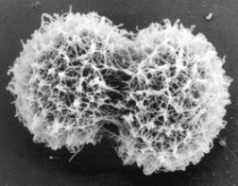Toxic cleanups get a microbe boost
Certain soil bacteria can help clean up toxic waste.
By Emily Sohn
Now, researchers from Cornell University have come up with a technique to help clean up toxic-waste sites. They think bacteria in the soil might help.
 |
|
This bacterium, discovered at a coal tar waste pit, can break down a chemical called naphthalene, which is the main ingredient of moth balls. The image shows a prickly parent bacterium dividing into two cells.
|
| Proceedings of the National Academy of Sciences |
The idea is to find microbes that naturally break down specific toxic chemicals. To test their strategy, the scientists went to a coal tar waste site belonging to a factory that once converted coal into gas. The waste included a chemical known as naphthalene, the main ingredient of moth balls. They marked a sample of naphthalene with a special atomic label so they could recognize it later and added it to the soil.
The researchers wanted to find out if there were tiny microbes in the soil that could break down naphthalene on their own. So, they put glass jars on top of different patches of soil. If microbes were breaking down naphthalene, the jars would fill with carbon dioxide gas marked with the same label the scientists had used to mark the ingredient. That would show
where in the soil the helpful bacteria lived. They could then look for those bacteria.
The researchers now hope to find bacteria that break down cancer-causing pollutants in coal tar. If it works out, bacteria could become important helpers for cleaning up dangerous chemical messes .
Going Deeper:
Goho, Alexandra. 2003. Toxic cleanups get a boost. Science News 164(Nov. 22):333. Available at http://www.sciencenews.org/20031122/note10.asp .
You can learn more about toxic waste cleanups at www.epa.gov/superfund/kids/ (U.S. Environmental Protection Agency).







